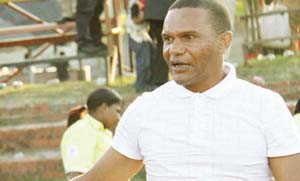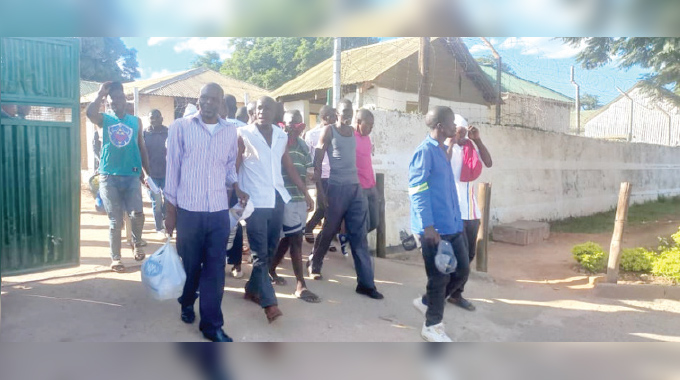Players confirm Warriors match-fixing

This came out in investigations carried out by the Zifa probe team on the Malaysia trip of 28 December 2009. The Warriors travelled to Asia without clearance from the Zifa board and the Sport and Recreation Commission (SRC) and it emerged that a lot of underhand dealings were taking place at Zifa during the era of the Wellington Nyatanga-led board.
Initially, the nation had been advised that the trip was part of the rewards for winning the Cosafa Senior Challenge Cup hosted on home soil last year. With suspicion gaining ground that there was something fishy on the Asia trips, the new Zifa Assembly decided to put a stop to the trips.
Documents at hand revealed that players and members of the technical team were clandestinely invited by Zifa programmes officer Jonathan Musavengana who is on suspension over the issue.
Joey Antipas travelled as head coach with Emmanuel Nyahuma his assistant, fitness trainer Thompson Matende, team medic a Sachikonye and physiotherapist Lloyd Maungwa and 18 players to Malaysia.
In his written submission to the committee investigating Asian trips,Antipas confirmed that they proceeded to Thailand where they played that country’s national team.
“We proceeded to Thailand and only to be told that we were playing against Thailand national team on arrival. The morning before kick off, we were introduced to Asian gentlemen who told us that we were to lose the game 1-0 after 90 minutes so that we would be paid handsomely.
“I queried it, citing the fact that it was difficult to lose a game 1-0, because our players had been off-season but I was told to play to instructions by Mr Jonathan Musavengana. I thereby said that I did not want to get involved. During the game there was an Asian guy whom I suspected to be a member of the Asia syndicate who sat on our national team bench and was receiving phone calls and telling the other person on the line all that was happening on the field of play,” wrote Antipas.
The Warriors lost the match 3-0 and they were not paid because they failed to deliver the perfect result. Antipas’ team was accused of dealing with another syndicate.
The team then moved to Malaysia where they played that country’s champions Selangor in a no-strings-attached match and they won 3-0.
On 31 December, the Warriors clashed with Syria in Kuala Lumpur, Malaysia. The game started late and an Asian gentleman paid the players and technical department US$500 each as they threatened not to play since they were not paid after the Thailand game.
“I once again did not get involved in the selection of the team. I recused myself from team selection and the team briefing. Mr Jonathan Musavengana was directing operations from the bench while receiving calls from the Asian syndicate. Whenever he received a call, he would stand up from the bench and dish out instructions to concede goals and that game was duly lost 6-0. To conclude that game, what a farce,” wrote Antipas.
At the airport the Warriors were paid US$1 000 each after they had met one member of the syndicate. Antipas said a bunch of US dollars was also given to Musavengana as Zifa’s share. “To conclude, I would say my hands received dirty money due to being forced into these games of illegal betting by Mr Jonathan Musavengana,” said Antipas.
Captain Method Mwanjali did not concede much information.
“I submitted my passport, I was told that the national team would be travelling to Malaysia to play training matches as promised by the ministry. I was also told that we would travel on 28 December 2009. We travelled to Thailand where we played one match and then went to Malaysia where we played two friendly matches. We received our allowances in Malaysia which were US$500 per person,” the Warriors captain wrote.
Gunners defender Daniel Vheremu wrote: “So as a team we agreed without knowing that it wasn’t just a friendly match but it had conditions. When they told us the conditions we disagreed with their conditions because they were not good to us. They wanted us to just play without scoring goals, which is difficult. But Musavengana persuaded us to play. We lost 3-0, which was not the result they wanted. They wanted us to draw 0-0 or lose 1-0.
“So they were furious. We were afraid because he (Asian gentleman who was part of the betting syndicate) said he lost lots of money. So in order for him to recover his money, he arranged two games for us. We then went to Malaysia to play against Syria. The condition was to lose 6-0. We disagreed but we were afraid because the guy wanted to recover his money. So we played and lost 6-0 and we were given US$1 000 each for that match at the airport, then we came back to Zimbabwe. Prior to the game we were told to lose the game 6-0 by Musavengana and Ruj (Asian) and because of fear we lost by that margin.”
Sachikonye said Musavengana was ever on the phone and that there was grumbling after the boys were not paid for the first game.
The doctor said Mwanjali was negotiating with the Asians.
“Captain Mwanjali was the negotiating man with the Asian guys and eventually that financial challenge was sorted and the game kicked off. Zifa needs to spruce itself up by changing its administration image. At times we travel with teams with no money at all and starve these players. Maybe that is why it is now easy for players to join these corrupt trips without reporting back the malpractices. Personally, I regret this trip and that is why I have voluntarily come forward,” wrote the team doctor.
Suspended Zifa chief executive officer Henrietta Rushwaya in her submission confirmed that the trip had indeed not been sanctioned. She said she had on 22 December sent Musavengana an sms instructing him to give players and officials their passports back.
“The trip has not been sanctioned by Zifa Council, give people back their passports. Mhepo dzasimuka,” she wrote.
Rushwaya alleged that Musavengana had communicated with the football association on his own email address.
In his written submission to the committee, Musavengana said he was giving evidence to the committee with a lot of reservations since the Nyatanga board had put the case to rest.
Musavengana said he had received a call from the Ministry of Tourism and Hospitality Industry concerning the holiday for the Cosafa team.
He said he had filled in Rushwaya with preparations for the trip and that (former national team coach) Sunday Chidzambwa had given him the team verbally.
Musavengana confirmed that he was the head of delegation and that the Thailand FA did not divulge any financial details.
The Ndumiso Gumede investigating committee’s summary was that Musavengana made pre-travel arrangements without the input of other officers and that he got an email from Rushwaya on 29 December to cancel the trip while in Thailand.
Another player Nyasha Mushekwi also confirmed that they had been handsomely paid US$1 000 for losing. The Mamelodi Sundowns player said Musavengana had told them Zifa would get US$10 000.
Mushekwi confirmed that the same men seen in Malaysia had been seen in South Africa for the Japan game featuring the Warriors before the World Cup finals. He said in one of the matches in Asia he asked to be substituted because his conscious could not allow him to continue playing a fixed game. A number of players who are in and outside the country have given evidence indicating that there was match-fixing involving the national team with a number of high profile coaches involved.
The report has since been submitted to Zifa president Cuthbert Dube and the SRC.
There is also another probe for earlier trips undertaken between 2007 and this year amid fears that Zimbabwe could have failed to be at this year’s Africa Cup of Nations finals in Angola because games were fixed.











Comments